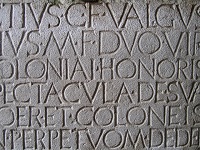How to Count in Latin: Difference between revisions
Jump to navigation
Jump to search
| (2 intermediate revisions by the same user not shown) | |||
| Line 151: | Line 151: | ||
==== Learn From Eleven to Nineteen ==== | ==== Learn From Eleven to Nineteen ==== | ||
# [[Image:LatinCte28.jpg|right|200px|thumb|Latin, Culture]] | # [[Image:LatinCte28.jpg|right|200px|thumb|Latin, Culture]]Learn ordinals from eleven to nineteen : | ||
Learn ordinals from eleven to nineteen : | |||
#* Eleventh: Undecimus | #* Eleventh: Undecimus | ||
#* Twelfth: Duodecimus | #* Twelfth: Duodecimus | ||
| Line 203: | Line 202: | ||
=== Learn Distributives === | === Learn Distributives === | ||
Distributives show "so many apiece." For example '''five coins for each''' worker. | [[Image:LatinCte30.jpg|right|200px|thumb|Evolution of Alphabets]]Distributives show "so many apiece." For example '''five coins for each''' worker. | ||
==== Learn From One to Nine ==== | ==== Learn From One to Nine ==== | ||
#Learn distributives from one to nine in Latin | #Learn distributives from one to nine in Latin | ||
| Line 268: | Line 267: | ||
#* Three-hundred and fifty-six for each: Centeni seni et quinquageni | #* Three-hundred and fifty-six for each: Centeni seni et quinquageni | ||
#* Seven-hundred and eighty-five for each: Centeni quini et octogeni | #* Seven-hundred and eighty-five for each: Centeni quini et octogeni | ||
== Related wikiHows == | == Related wikiHows == | ||
*[[Pronounce Latin|How to Pronounce Latin]] | *[[Pronounce Latin|How to Pronounce Latin]] | ||
| Line 274: | Line 274: | ||
*[[Study Latin|How to Study Latin]] | *[[Study Latin|How to Study Latin]] | ||
*[[Understand Basic Latin|How to Understand Basic Latin]] | *[[Understand Basic Latin|How to Understand Basic Latin]] | ||
*[[How to Count in Italian|How to Count in Italian]] | *[[How to Count in Italian|How to Count in Italian]] | ||
*[[How to Tell Time and Date in Italian|How to Tell Time and Date in Italian]] | *[[How to Tell Time and Date in Italian|How to Tell Time and Date in Italian]] | ||
*[[How to Count in Indo-European Language|How to Count in Indo-European Language]] | *[[How to Count in Ancient Indo-European Language|How to Count in Ancient Indo-European Language]] | ||
Latest revision as of 12:22, 8 April 2014

Latin is a language not spoken by any modern nation. Such a language normally is called a dead (extinct) or ancient language. Surprisingly, Latin is a modern language learned by millions of people for different reasons and also is used within scientific world of all nations. Latin numbers have their own significance.
Steps
Latin numerals have cardinal, ordinal, distributive, and numeral-adverbial forms.
Learn Cardinals
Learn From One to Nine
- Learn counting cardinals from one to nine in Latin

Augustus - One: Unus
- Two: Duo
- Three: Tres
- Four: Quattuor
- Five: Quinque
- Six: Sex
- Seven: Septem
- Eight: Octo
- Nine: Novem
Learn From Eleven to Nineteen
- Learn from eleven to nineteen :
- Eleven: Undecim
- Twelve: Duodecim
- Thirteen: Tredecim
- Fourteen: Quattuordecim
- Fifteen: Quindecim
- Sixteen: Sedecim
- Seventeen: Septendecim
- Eighteen: Duodeviginity (actually, two to twenty)
- Nineteen: Undeviginity (actually, one to twenty)
Learn Multiples of Ten

- Now it is time to learn multiples of ten :
- Ten: Decem
- Twenty: Viginity
- Thirty: Triginta
- Forty: Quadraginta
- Fifty: Quinquaginta
- Sixty: Sexaginta
- Seventy: Septuaginta
- Eighty: Octoginta
- Ninety:Nonaginta
Learn Multiples of Hundred and Thousand

- Learn multiples of hundred :
- Hundred: Centum
- Two-hundred: Ducenti
- Three-hundred: Trecenti
- Four-hundred: Quadringenti
- Five-hundred: Quingenti
- Six-hundred: Sescenti
- Seven-hundred: Septingenti
- Eight-hundred: Octingenti
- Nine-hundred: Nongenti
- And at last,
- Thousand: Mille
- Two-thousand: Duo milia
- Three-thousand: Tre milia
- hundred-thousand: Centum milia
- And a million: Deciec centena milia (actually ten-hundred-thousand)
Learn Smaller number Between These Numbers
- Once you know the larger numbers, knowing small numbers is easy in Latin.
- In Latin , in contrast to English, they say seven and forty not forty-seven. Hence,
- Forty-seven: Septem et quadraginta
- Fifty-six: Sex et quinquaginta
- Eighty-five: Quinque et octoginta
- This goes until we get to one-hundred where order of words becomes like English. Thus,
- Hundred and forty-seven: Centum quadraginta septem
- Three-hundred and fifty-six: Trecenti quinquaginta sex
- Seven-hundred and eighty-five: Septingenti octoginta quinque
Learn Adverbials

- Adverbials (the numeral adverbs) define the answer to "how many times?"
- Note that, some how like English you might interpret Latin "ies" as "times."
Learn From One to Nine
- Learn numeral adverbs from one to nine in Latin.
- Once: Semel
- Twice: Bis
- Thrice: Ter
- Four times: Quater
- Five times: Quinquies
- Six times: Sexies
- Seven times: Septies
- Eight times: Octies
- Nine times: Novies
Learn From Eleven to Nineteen

- Learn adverbials from eleven to nineteen :
- Eleven times: Undecies
- Twelve times: Duodecies
- Thirteen times: Ter decies (written separate)
- Fourteen times: Quater decies (written separate)
- Fifteen times: Quinquies decies (written separate)
- Sixteen times: Sexies decies (written separate)
- Seventeen times: Septies decies (written separate)
- Eighteen times: Duodevicies
- Nineteen times: Undecies
Learn Multiples of Ten
- Now learn numeral adverbs multiples of ten :
- Ten times: Decies
- Twenty times: Vicies
- Thirty times: Tricies
- Forty times: Quadragies
- Fifty times: Quinquagies
- Sixty times: Sexagies
- Seventy times: Septuagies
- Eighty times: Octogies
- Ninety times: Nonagies
Learn Multiples of Hundred and Thousand

- Learn multiples of hundred for adverbials:
- Hundred times: Centies
- Two-hundred times: Ducenties
- Three-hundred times: Trecenties
- Four-hundred times: Quadringenties
- Five-hundred times: Quingenties
- Six-hundred times: Sexcenties
- Seven-hundred times: Septingenties
- Eight-hundred times: Octingenties
- Nine-hundred times: Nongenties
- And at last,
- Thousand times: Milies
- Two-thousand times: Bis milies
- Three-thousand times: Ter milies
- hundre-thousand times: Centies milies
- And a million times: Decies centies milies
Learn Smaller number Between These Numbers

- To build numeral adverb change each cardinal to its adverbial form. Hence,
- Forty-seven times: Septies et quadragies
- Fifty-six times: Sexies et quinquagies
- Eighty-five times: Quinqies et octogies
- Hundred and forty-seven times: Centies quadragies septies
- Three-hundred and fifty-six times: Trecenties quinquagies sexies
- Seven-hundred and eighty-five times: Septingenties octogies quinquies
Learn Ordinals
Ordinals define the answer to "which in a row?"
Learn From One to Nine
- Learn ordinals from one to nine in Latin.
- First: Primus
- Second: Secundus
- Third: Tertius
- Fourth: Quartus
- Fifth: Quintus
- Sixth: Sextus
- Seventh: Septimus
- Eighth: Octavus
- Nineth: Nonus
Learn From Eleven to Nineteen

Latin, Culture - Eleventh: Undecimus
- Twelfth: Duodecimus
- Thirteenth: Tertius decimus (written separate)
- Fourteenth: Quartus decimus (written separate)
- Fifteenth: Quintus decimus (written separate)
- Sixteenth: Sextus decimus (written separate)
- Seventeenth: Septimus decimus (written separate)
- Eighteenth: Duodevicesimus
- Nineteenth: Undevicesimus
Learn Multiples of Ten
- Now learn ordinals multiples of ten :
- Tenth: Decimus
- Twentieth: Vicesimus
- Thirtieth: Tricesimus
- Fortieth: Quadragesimus
- Fiftieth: Quinquagesimus
- Sixtieth: Sexagesimus
- Seventieth: Septuagesimus
- Eightieth: Octogesimus
- Ninetieth: Nonagesimus
Learn Multiples of Hundred and Thousand

- Learn multiples of hundred for ordinals:
- Hundredth: Centesimus
- Two-hundredth: Ducentesimus
- Three-hundredth: Trecentesimus
- Four-hundredth: Quadringentesimus
- Five-hundredth: Quingentesimus
- Six-hundredth: Sexcentesimus
- Seven-hundredth: Septingentesimus
- Eight-hundredth: Octingentesimus
- Nine-hundredth: Nongentesimus
- And at last,
- Thousandth: Millesimus
- Two-thousandth: Bis millesimus (twice thousandth)
- Three-thousandth: Ter millesimus (thrice thousandth)
- hundred-thousandth: Centies millesimus (hundred-times thousandth)
- And a million times: Decies centies millesimus (ten-times hundred-times thousandth)
Learn Smaller number Between These Numbers
- To build ordinals change each cardinal to its ordinal form. Hence,
- Forty-seventh: Septimus et quadragesimus
- Fifty-sixth: Sextus et quinquagesimus
- Eighty-fifth: Quintus et octogesimus
- Hundred and forty-seventh: Centesimus quadragesimus septimus
- Three-hundred and fifty-sixth: Trecentesimus quinquagesimus sextus
- Seven-hundred and eighty-fifth: Septingentesimus octogesimus quintus
Learn Distributives

Distributives show "so many apiece." For example five coins for each worker.
Learn From One to Nine
- Learn distributives from one to nine in Latin
- One for each: Singuli
- Two for each: Bini
- Three for each: Terni
- Four for each: Quaterni
- Five for each: Quini
- Six for each: Seni
- Seven for each: Septeni
- Eight for each: Octoni
- Nine for each: Noveni
Learn From Eleven to Nineteen

- Learn from eleven to nineteen :
- Eleven for each: Undeni
- Twelve for each: Duodeni
- Thirteen for each: Terni deni
- Fourteen for each: Quaterni deni
- Fifteen for each: Quini deni
- Sixteen for each: Seni deni
- Seventeen for each: Septeni deni
- Eighteen for each: Dudeviceni
- Nineteen for each: undeviceni
Learn Multiples of Ten
- Now it is time to learn multiples of ten :
- Ten for each: Deni
- Twenty for each: Viceni
- Thirty for each: Triceni
- Forty for each: Quadrageni
- Fifty for each: Quinquageni
- Sixty for each: Sexageni
- Seventy for each: Septuageni
- Eighty for each: Octogeni
- Ninety for each: Nonageni
Learn Multiples of Hundred and Thousand

- Learn multiples of hundred :
- Hundred for each: Centeni
- Two-hundred for each: Duceni
- Three-hundred for each: Treceni
- Four-hundred for each: Quadringeni
- Five-hundred for each: Quingeni
- Six-hundred for each: Sesceni
- Seven-hundred for each: Septingeni
- Eight-hundred for each: Octingeni
- Nine-hundred for each: Nongeni
- And at last,
- Thousand for each: Singula milia
- Two-thousand for each: Bina milia
- Three-thousand for each: Trena milia
- hundred-thousand for each: Centena milia
- And a million for each: Decies centena milia (actually ten-times of hundred-thousand for each).
Learn Smaller number Between These Numbers
- Once you know the larger numbers, knowing small numbers is easy in Latin.
- In Latin , in contrast to English, they say seven and forty not forty-seven. Hence,
- Forty-seven for each: Septeni et quadrageni
- Fifty-six for each: Seni et quinquageni
- Eighty-five for each: Quini et octogeni
- This goes until we get to one-hundred where order of words becomes like English. Thus,
- Hundred and forty-seven for each: Centeni septeni et quadrageni
- Three-hundred and fifty-six for each: Centeni seni et quinquageni
- Seven-hundred and eighty-five for each: Centeni quini et octogeni